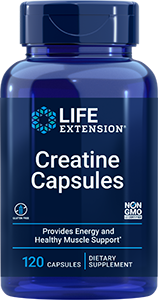
13 Workout Supplements that Work: From Creatine to BCAAs
Published: June 2022
Thinking about competing in that upcoming 5K? Need a boost for CrossFit? Just want to maintain the muscles you've got? Welcome to the world of workout supplements!
It can be a crowded place, with whole stores dedicated to the pre-workout powders, post-workout drinks, protein bars, and other supplements that help make your workout work for you! The good news is, it doesn't have to be confusing, and these supplements are worth learning about, even if you aren't an athlete.
Why? Well, muscle mass gets harder to maintain with age. That means gym-goers aren't the only ones who can benefit from lean muscle-building supplements. They are good for anyone looking to maintain muscle health and cellular energy. Plus, many of these supplements have additional perks, such as promoting a healthy immune system, stress response and brain health!
So how do you decide which pre-workout and post-workout formulas are right for you? The answers will depend on your diet, body composition and fitness goals.
What are workout supplements?
There are a number of different kinds of workout supplements, but the two most popular kinds are pre-workout and post-workout varieties. Pre-workouts (which sometimes contain a stimulant like caffeine, although non-caffeinated options are available) are designed to help support your physical performance, both inside and outside the gym. These are the energy boosters and endurance enhancers of the sports supplement world.
Post-workout supplements are designed for healthy muscle mass and post workout recovery. Both pre-workout and post-workout products are known as "ergogenic supplements," meaning they support energy production, energy use, or recovery.
As for the many popular nutrients you'll find in both pre-workout and recovery formulas—creatine, whey protein, beta-alanine, caffeine and other ingredients—they each serve different purposes to support your performance, endurance and muscle repair. Let's dive in.
Do workout supplements work?
There are many pre-workout supplements, and placebo-controlled studies show that these pre-workouts (or at least, certain ingredients in them) help support athletic performance.
Research has found pre-workout supplements—in combination with resistance exercise or high-intensity workouts—promote muscular endurance, energy production and more. Some contain stimulants such as caffeine, which can also provide a dose of motivation by supporting a "ready to work out" mood.
Post-workout supplements, on the other hand, focus on muscle growth, comfort and recovery. Protein powders and bars fall into this category, helping to provide the nutrients needed to promote lean muscle mass. Some can also help relieve the discomfort that occasionally follows an intense workout session.
Best supplements to take while working out: 13 must-haves
The key to any fitness plan—whether you are looking to build muscle mass or maintain a healthy body and mind—is a healthy diet, filled with the nutrients you need to achieve your workout goals.
1. Protein powders
Protein is an important part of a healthy diet, no matter how much or how little you exercise. Although we associate protein with muscle growth, it does much more than that. Eating protein helps boost your metabolism and fat-burning, and is featured prominently in the keto diet. It also helps you feel full longer, inhibiting those snack attacks and supporting healthy weight management. Studies show it is good for bone, immune and cardiovascular health, as well.
Protein powders are popular because our protein needs increase along with exercise intensity. After a workout, the body repairs and replaces muscle fibers, which builds muscle mass. But this process is dependent on protein synthesis, which is why protein supplements are encouraged after exercise (giving you a great excuse for a reward shake or "way to go" cookie). Research also shows taking whey protein after intense strength training can facilitate healthy muscle recovery, so you're ready to do it all again tomorrow.
If you stick to a vegan diet or avoid dairy, you have options beside whey protein. Plant-based pea protein and hemp protein are good ways to support muscle growth and your immune system health. Note that many protein powders have other performance-enhancing ingredients mixed in, such as creatine. Some will even contain caffeine (so if you prefer a stimulant-free option, definitely read the label!)
2. CoQ10
CoQ10 is best-known for heart health, because it plays such an important role in cellular energy production. But any processes that are heavily dependent on energy—and workouts certainly qualify!—would benefit from this compound. CoQ10 is a fat-soluble molecule found throughout the body in cell membranes, and your cells need it to produce ATP, or cellular fuel.
CoQ10 has other benefits, as well. It has antioxidant properties, so it can help quench those oxidative stress-causing compounds that come from exercise. CoQ10 also helps inhibit inflammatory factors to support a healthy heart, and it's been linked to nitric oxide support, which is good for your whole vascular system.
As a pre-workout supplement, CoQ10 was found in a placebo-controlled clinical study to inhibit perceived fatigue among distance runners. But you don't need to sign up for a marathon to benefit from CoQ10's energy support and antioxidant qualities. It can support workout routines from CrossFit to crossing the street.
3. BCAAs
Branched-chain amino acids, or BCAAs, such as valine, leucine and isoleucine, are popular muscle support supplements, particularly among athletes. A popular ingredient in pre-workouts and post-workout supplements, BCAAs play a valuable role in a fitness routine because they support energy and athletic performance, and may help relieve minor stiffness and discomfort after that performance. Amino acids support muscle function and health not only through healthy muscle recovery, but also by inhibiting age-related muscle decline. This is great news for those who want to keep those lean muscles going as they grow older.
Branched-chain amino acids supplements are often combined with protein in multi-ingredient supplement formulas to support lean muscle mass and healthy liver function. Research shows the benefits of combining amino acids and protein, which can help athletes workout longer and feel less tired and help relieve muscle discomfort.
4. Creatine
Ready to give your sports training a kick? Creatine (or creatine monohydrate) is an amino acid derivative that can help with lean muscle mass, weight goals and exercise performance.
People often use creatine supplements to take their workouts to the next level, because creatine helps to replenish your muscle cells' energy and promotes muscle strength.
That means that when combined with resistance training or high-intensity exercise, creatine can help you stay strong, healthy, and smart! Smart? Yes! Creatine also supports cognition and brain health, which makes this an intelligent supplement choice either alone or as a nutrient added to enhance whey protein. It's also often the star of pre-workouts, along with caffeine for energy.
Explore Our Best Active Lifestyle & Fitness Supplements
5. Carnitine
Another amino acid derivative, carnitine is found in nearly all cells of the body, and it plays an essential role energy production: It transports fats into the mitochondria to be turned into energy. But its job doesn't end there. Carnitine also helps transport compounds out of the mitochondria to prevent accumulation. (Don't you love it when something cleans up after itself?)
Carnitine is produced by the liver and kidneys, and it can be obtained through diet, but research shows benefits from taking carnitine dietary supplements. Since carnitine levels decline as we age, older adults may especially benefit from this workout warrior!
Carnitine helps support the process of fat burning for energy, meaning it helps keep your muscles fueled during your workout, and may help with weight management. Research also shows carnitine may help you level up power-wise and recover better after exercise. This is because L-carnitine fights free radical formation, which helps inhibit occasional muscle discomfort.
6. Taurine
You might have heard of taurine because it is an ingredient in many energy drinks and pre-workouts. It promotes cellular energy, helping you to power through that extra set at the gym, or even that afternoon slump.
This sulfur-bearing amino acid looms large in our hearts and brains and is particularly important in the mitochondria, where it plays a role in fat metabolism. As an antioxidant, taurine helps to keep our mitochondria healthy and functioning optimally. It also benefits heart and cognitive function, overall vascular function, and eye health.
When taurine is used as a pre-workout supplement, research shows it promotes athletic performance, endurance, peak power, healthy muscle mass, and healthy muscle recovery. So if you're going for a new mileage or cardio goal, you might want to reach for this first!
A taurine supplement may benefit vegans and vegetarians, as well, because this nutrient is not found in plant foods. Instead, it comes from animal-based proteins. Your heart and brain might be producing their own taurine, but it's happening in very limited quantities. So taking a taurine supplement may be the best way to make sure you are getting what you need.
7. Glutamine
Glutamine is the most abundant amino acid in the body, and it plays a number of roles in health and fitness, fighting everything from fatigue to oxidative stress.
L-glutamine is a precursor to glutathione, which is one of the main antioxidants working to protect your cells and keep you healthy. L-glutamine benefits include supporting a healthy inflammatory response and encouraging healthy intestinal function. L-glutamine is also beneficial for heart health, liver metabolism and immune system health.
Studies show supplementing with l-glutamine encourages healthy muscle recovery after intense exercise. Glutamine helps enhance energy stores in muscle tissue—which supports healthy muscle mass—and helps fight fatigue during prolonged exercise.
Glutamine is present in any foods high in protein, and your body makes it. But anyone who would like to improve their gut health, heart function, or immune system—or people who simply need more energy—might find glutamine supplements helpful.
8. L-tyrosine
Sometimes life can be stressful, but those situations are where L-tyrosine shines. This amino acid can be beneficial for your body and mind during physically challenging situations, such as extreme temperatures (both hot and cold) and lack of sleep (two conditions that can make exercise harder than usual!). L-tyrosine also has been shown to enhance performance on tasks like cognitive flexibility and creative problem solving.
If you often eat beans, fish and eggs, you are getting good dietary sources of tyrosine. Your body also makes this compound. But an extra dose could provide a boost when you need it, such as when you work out in the heat (or extreme cold). Research shows taking L-tyrosine pre-workout supplements helps increase endurance capacity in hot and humid conditions.
L-tyrosine supplements may also help promote working memory and mood, and this compound is often used in thyroid support supplements. That's because L-tyrosine is needed for the synthesis of thyroid hormones and the neurotransmitters dopamine, norepinephrine and epinephrine.
9. Beta-alanine and carnosine
Want to level up your high-intensity exercise? This duo might be able to help. Beta-alanine (along with histidine) is needed to make carnosine, a protein building block that is highly concentrated in muscle and brain tissue.
Research suggests beta-alanine supplementation can lead to higher muscle carnosine content when taken consistently. Studies also found an improvement in high-intensity exercise capacity as a result of taking beta-alanine.
10. Rhodiola
Rhodiola (Rhodiola rosea) is another pre-workout supplement that made its name in another health area, namely stress. Rhodiola is an adaptogen and a nootropic, meaning it supports mental performance and memory while it helps you manage stress and stay energized.
Like many pre-workout supplements, Rhodiola promotes ATP production in the mitochondria and cellular energy metabolism. This means it supports energy, stamina, strength, and improved athletic performance. Research also shows it helps reduce oxidative stress, supports healthy muscle performance and relieves muscle discomfort during exercise.
11. Curcumin
What's good for the joints is good for the muscles, right? In this case, absolutely! Curcumin, one of the main compounds found in the golden spice, turmeric, is most famous for its ability to help inhibit inflammation to support joint health. This extremely popular supplement also promotes immune and brain health, and it supports already-healthy blood sugar levels. Studies also suggest curcumin helps promote healthy bowel function and healthy pancreatic function.
What does this have to do with exercise? Well, curcumin is a powerful antioxidant, so it helps protect against the oxidative stress from your workout. Research shows curcumin also encourages a healthy inflammatory response, supports healthy muscle performance and comfort during exercise, and promotes healthy post-exercise muscle recovery.
12. Quercetin
Like curcumin, quercetin's role as an antioxidant and its ability to promote a healthy inflammatory response, help to land it on this list of workout supplements. Quercetin is a plant flavonoid that has tremendous health benefits—ranging from immune support to cell health. It also supports already-healthy blood pressure and blood sugar levels.
Dark-colored foods, such as berries, red onions and capers, have quercetin, but it's tough to get much of this compound from diet alone. Studies show that as a workout supplement, quercetin may help relieve general fatigue, support healthy muscle performance, and relieve muscle discomfort during exercise.
13. Astaxanthin
Another antioxidant, astaxanthin is a carotenoid with multiple health benefits. This compound helps inhibit inflammation to promote joint comfort, so you can keep going on those reps in the gym a little longer. To help with energy, astaxanthin protects the mitochondria and supports cardiovascular and metabolic health. It also encourages strength and endurance during athletic performance, and it may promote muscle health by fighting oxidative stress and supporting post exercise recovery.
You can get astaxanthin from salmon, crab and shrimp, but for many, a supplement is a better way to claim this compound's health qualities. It encourages a healthy immune response, supports healthy cognition and memory, and promotes eye health—so you'll also see it in eye support formulas.
Should you take caffeine before a workout?
Many pre-workouts contain caffeine, but is it wise for you to give yourself an extra "boost" before you hit the gym? The answer to this question really depends on a number of factors, including how much caffeine you're already getting in your diet (coffee lovers, we're looking at you!) and whether you get side effects from caffeine. Keep in mind that many pre-workouts contain as many mg of caffeine as an average cup of coffee!
Certainly, caffeine may boost your performance, but it's not a necessary ingredient if you have caffeine sensitivity. Explore non-stimulant options if you're wary of the "jitters" (or are already on your second cappuccino while reading this blog!)
Are workout supplements safe?
Many studies have been done on pre-workout and post-workout supplements, and they are generally safe, with minor (if any) side effects. As always, though, discuss your fitness routine and fitness supplements with a doctor, and be sure to use the supplements as directed. After all, the recommended dosage is there for a reason!
How to take workout supplements
Depending on the supplements, some should be taken with meals. Others (such as protein) can be taken alone, and protein powder can be incorporated into plenty of delicious recipes. However you choose to take your supplements, try to make it part of your daily routine.
What is the best time to take workout supplements?
You've heard that breakfast is the most important meal of the day, and that motto holds true here. Adding protein to breakfast is a good idea: A higher protein breakfast and lunch is associated with higher total protein intake in older adults, which is one of the most important factors in supporting muscle health. Although many people take workout supplements, such as protein powder, after exercise, it is important to be consistent in taking it.
Pre-workout supplements should, of course, be taken before exercise, usually because they provide boosts in energy that can help you power through your routine. If you want to time your pre-workout so that it "kicks in" just as you're gearing up to go, try taking it on-the-go, mixed in a water bottle.
Should you eat before taking pre-workout supplements?
Eating before exercise is a personal preference. Eating a meal with your pre-workout supplement may help avoid side effects and eating also helps fuel the body before exercise. However, it is not necessary, and some prefer to eat after exercise instead.
References
- AbuMoh'd, Mohammad Fayiz et al. "Effects of Oral Branched-Chain Amino Acids (BCAAs) Intake on Muscular and Central Fatigue During an Incremental Exercise." J Hum Kinet., March 2020, https://pubmed.ncbi.nlm.nih.gov/32269649/
- Ahrendt, Dale M., M.D. "Ergogenci Aids: Counseling the Athlete." Am Fam Physician, March 2001, https://www.aafp.org/afp/2001/0301/p913.html
- Almeida, Douglas et al. "Creatine supplementation improves performance, but is it safe? Double-blind placebo-controlled study." J Sports Med Phys Fitness, July 2020, https://pubmed.ncbi.nlm.nih.gov/32597619/
- Askarpour, Moein et al. "Beneficial effects of l-carnitine supplementation for weight management in overweight and obese adults: An updated systematic review and dose-response meta-analysis of randomized controlled trials." Pharmacological Research, January 2020, https://www.sciencedirect.com/science/article/abs/pii/S1043661819315117
- Ballman, Christopher G. et al. "Effects of short-term Rhodiola Rosea (Golden Root Extract) supplementation on anaerobic exercise performance." Jornal of Sports Sciences, 2019, https://www.tandfonline.com/doi/abs/10.1080/02640414.2018.1538028
- Bazzucchi, Ilenia et al. "The Effects of Quercetin Supplementation on Eccentric Exercise-Induced Muscle Damage." Nutrients, January 2019, https://www.mdpi.com/2072-6643/11/1/205
- Brown, Daniel R et al. "Astaxanthin in Exercise Metabolism, Performance and Recovery: A Review." Front Nutr., January 2018, https://pubmed.ncbi.nlm.nih.gov/29404334/
- Chis, Bogdan Augustin et al. "Q10 Coenzyme Supplementation can Improve Oxidative Stress Response to Exercise in Metabolic Syndrome in Rats." Int J Vitam Nutr Res., January 2020, https://pubmed.ncbi.nlm.nih.gov/30887903/
- Cintineo, Harry P. et al. "Effects of Protein Supplementation on Performance and Recovery in Resistance and Endurance Training." Front Nutr., 2018, https://www.ncbi.nlm.nih.gov/pmc/articles/PMC6142015/
- Coqueiro, Audrey Yule et al. "Glutamine as an Anti-Fatigue Amino Acid in Sports Nutrition." Nutrients, April 2019, https://pubmed.ncbi.nlm.nih.gov/30999561/
- Doma, Kenji et al. "The effect of branched-chain amino acid on muscle damage markers and performance following strenuous exercise: a systematic review and meta-analysis." Appl Physiol Nutr Metab., November 2021, https://pubmed.ncbi.nlm.nih.gov/34612716/
- Duarte, Nuno M et al. "Intake of whey isolate supplement and muscle mass gains in young healthy adults when combined with resistance training: a blinded randomized clinical trial (pilot study)." J Sports Med Phys Fitness, January 2020, https://pubmed.ncbi.nlm.nih.gov/31565912/
- Fernández-Lázaro, Diego et al. "Impact of Optimal Timing of Intake of Multi-Ingredient Performance Supplements on Sports Performance, Muscular Damage, and Hormonal Behavior across a Ten-Week Training Camp in Elite Cyclists: A Randomized Clinical Trial" Nutrients, November 2021, https://www.ncbi.nlm.nih.gov/pmc/articles/PMC8618318/
- Fielding, Roger et al. "L-Carnitine Supplementation in Recovery after Exercise." Nutrients, March 2018, https://www.mdpi.com/2072-6643/10/3/349/htm
- Gunnars, Kris, BSc. "10 Science-Backed Reasons to Eat More Protein." Healthline, March 2019, https://www.healthline.com/nutrition/10-reasons-to-eat-more-protein
- Harty, Patrick S. et al. "Multi-ingredient pre-workout supplements, safety implications, and performance outcomes: a brief review," J Int Soc Sports Nutr., August 2018, https://pubmed.ncbi.nlm.nih.gov/30089501/
- Jong, Chain Ju et al. "The Role of Taurine in Mitochondria Health: More Than Just an Antioxidant." Molecules, August 2021, https://www.ncbi.nlm.nih.gov/pmc/articles/PMC8400259
- Khemtong, Chutimon et al. "Does Branched-Chain Amino Acids (BCAAs) Supplementation Attenuate Muscle Damage Markers and Soreness after Resistance Exercise in Trained Males? A Meta-Analysis of Randomized Controlled Trials." Nutrients, May 2021, https://pubmed.ncbi.nlm.nih.gov/34072718/
- Kurtz, Jennifer A. et al. "Taurine in sports and exercise." J Int Soc Sports Nutr., May 2021, https://pubmed.ncbi.nlm.nih.gov/34039357/
- Lu, Yao et al. "Effects of Rhodiola Rosea Supplementation on Exercise and Sport: A Systematic Review." Front Nutr., April 2022, https://pubmed.ncbi.nlm.nih.gov/35464040/
- Manaf, Faizal A et al. "Branched-chain amino acid supplementation improves cycling performance in untrained cyclists." J Sci Med Sport, April 2021, https://pubmed.ncbi.nlm.nih.gov/33162329/
- Saunders, Bryan et al. "Infographic. A systematic review and meta-analysis of the effect of β-alanine supplementation on exercise capacity and performance." British Journal of Sports Medicine, 2020, https://bjsm.bmj.com/content/54/15/925.long
- Schoenfeld, Brad Jon, PhD, CSCS, FNSCA et al. "Is There a Postworkout Anabolic Window of Opportunity for Nutrient Consumption? Clearing up Controversies." J Orthop Sports Phys Ther., November 2018, https://www.jospt.org/doi/10.2519/jospt.2018.0615
- Suhett, Lara Gomes et al. "Effects of curcumin supplementation on sport and physical exercise: a systematic review." Crit Rev Food Sci Nutr., 2021, https://pubmed.ncbi.nlm.nih.gov/32282223/
- Surai, Peter F. et al. "Taurine as a Natural Antioxidant: From Direct Antioxidant Effects to Protective Action in Various Toxicological Models." Anxioxidants (Basel), December 2021, https://www.ncbi.nlm.nih.gov/pmc/articles/PMC8698923/
- Suzuki, Yoshio et al. "Short-term ubiquinol-10 supplementation alleviates tissue damage in muscle and fatigue caused by strenuous exercise in male distance runners." Int J Vitam Nutr Res., June 2021, https://pubmed.ncbi.nlm.nih.gov/32003645/
- Tumilty, Les et al. "Oral tyrosine supplementation improves exercise capacity in the heat." European Journal of Applied Physiology, March 2011, https://link.springer.com/article/10.1007/s00421-011-1921-4
- Ulusoy, Hande Gül et al. "A minireview of quercetin: from its metabolism to possible mechanisms of its biological activities." Crit Rev Food Sci Nutr., 2020, https://pubmed.ncbi.nlm.nih.gov/31680558/
- Verreijen, A.M. et al. "A higher protein intake at breakfast and lunch is associated with a higher total daily protein intake in older adults: a post‐hoc cross‐sectional analysis of four randomised controlled trials." J Hum Nutr Diet, April 2021, https://www.ncbi.nlm.nih.gov/pmc/articles/PMC8048646/
- Wong, Sok Kuan et al. "Effects of astaxanthin on the protection of muscle health (Review)." Experimental and Therapeutic Medicine, July 2020, https://www.spandidos-publications.com/10.3892/etm.2020.9075
- "Carnitine." National Institutes of Health, https://ods.od.nih.gov/factsheets/Carnitine-HealthProfessional/
- "Dietary Supplements for Exercise and Athletic Performance." National Institutes of Health, https://ods.od.nih.gov/factsheets/ExerciseAndAthleticPerformance-HealthProfessional/
- "L-Carnitine." Oregon State University, https://lpi.oregonstate.edu/mic/dietary-factors/L-carnitine
- "Rhodiola."National Center for Complementary and Integrative Health, https://www.nccih.nih.gov/health/rhodiola










